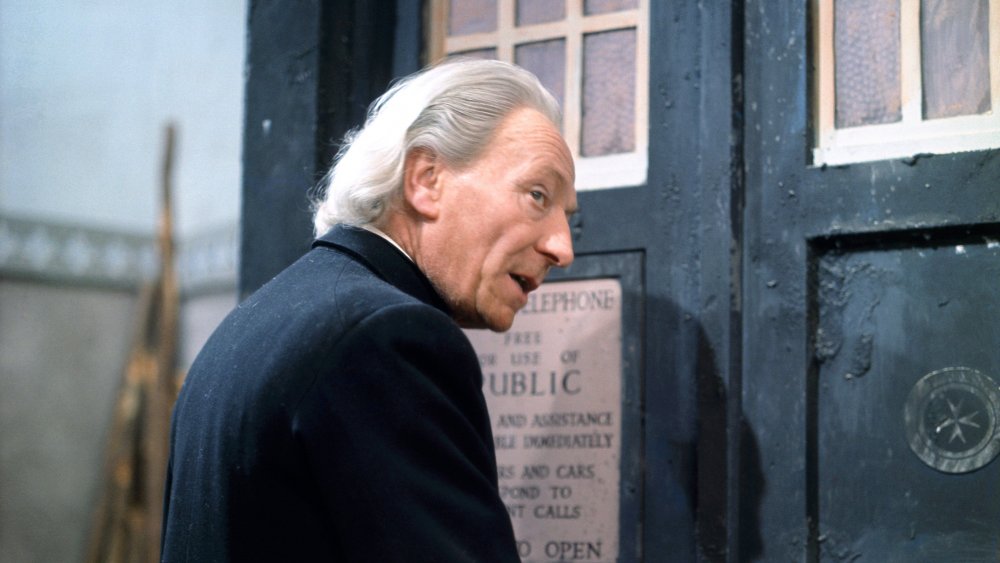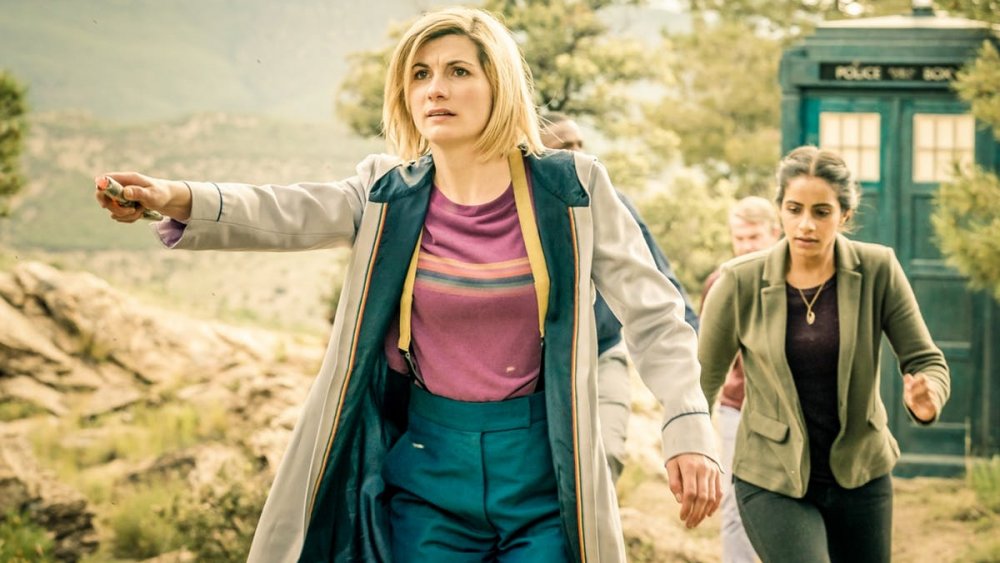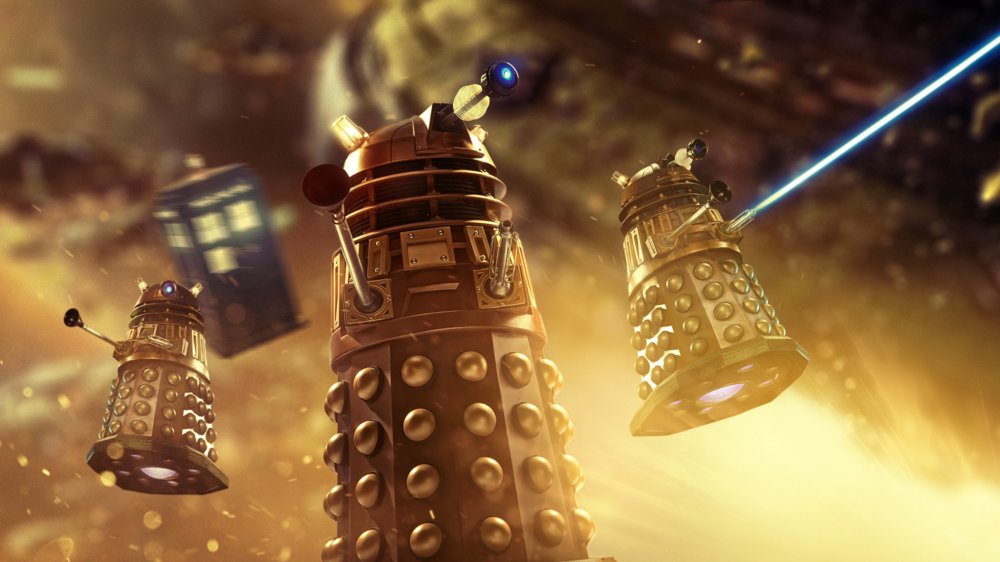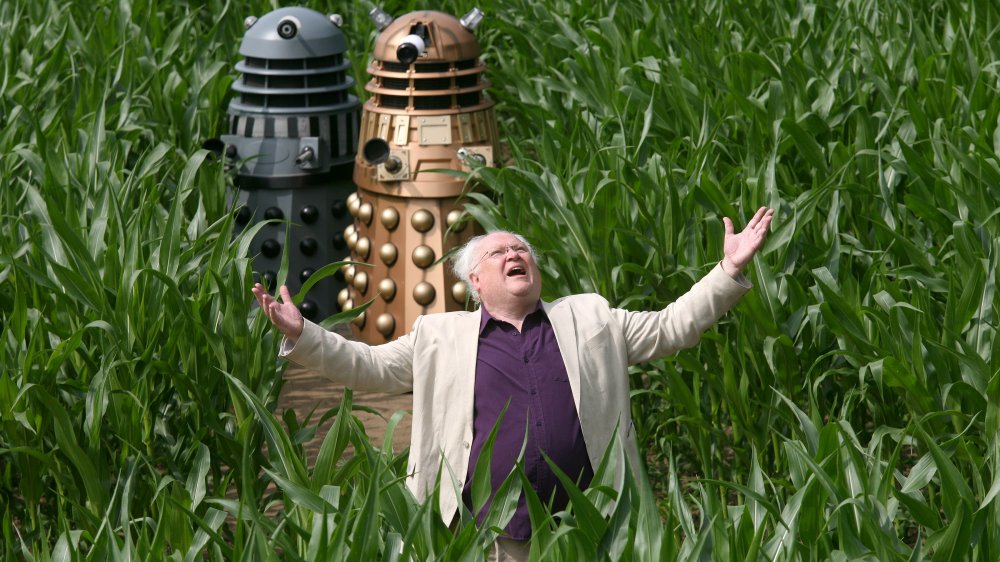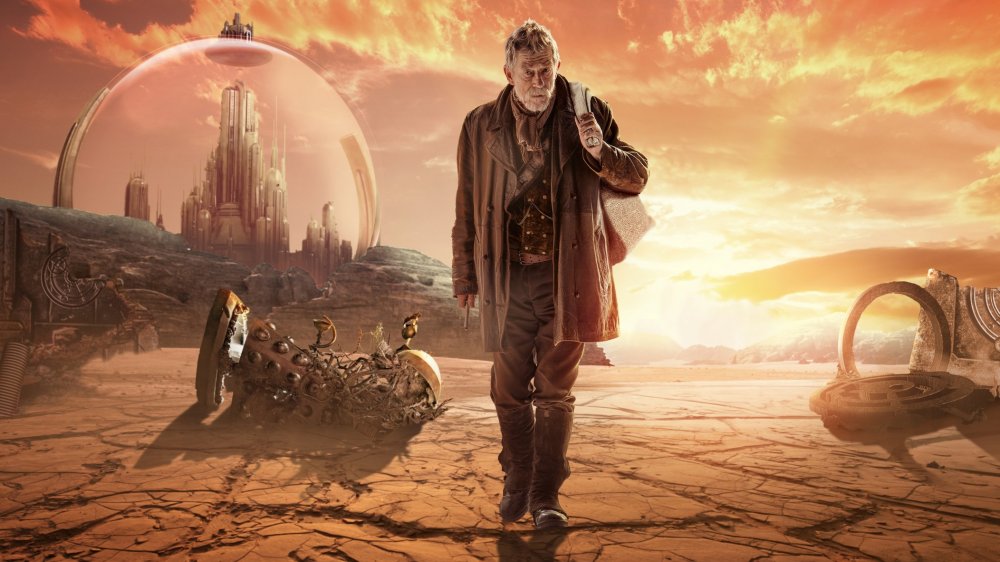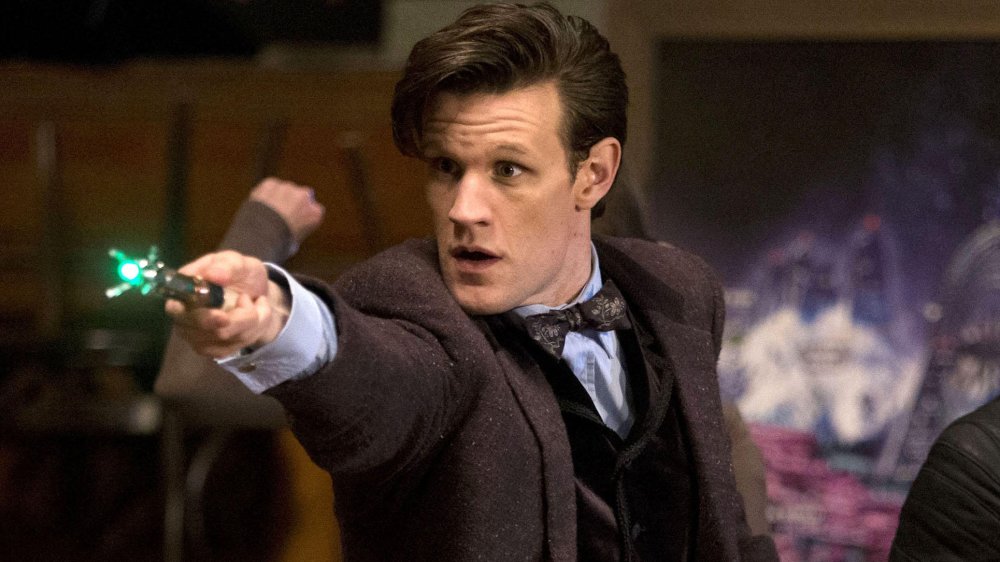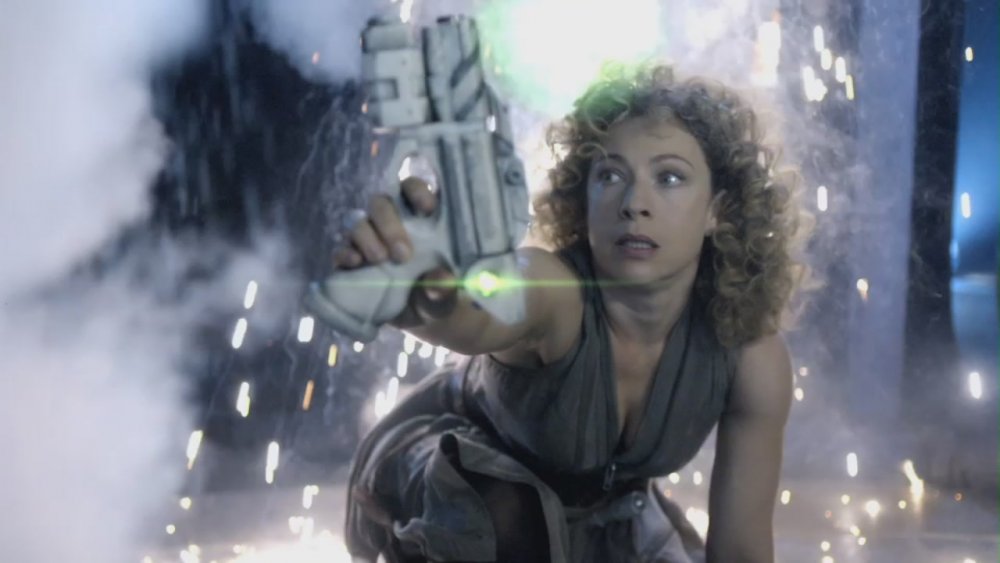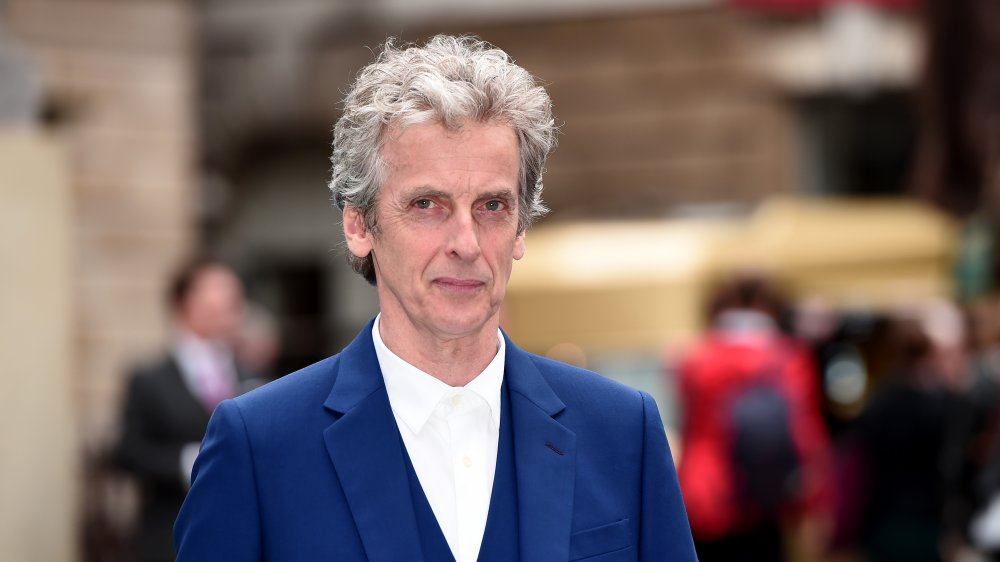The Wibbly Wobbly Doctor Who Timeline Explained
Doctor Who provides more chances than most sci-fi for continuity to get all tangled up. The show centers around a time-traveling alien who has lived through or visited untold eons of cosmic history in the 50-plus years that the series has been on television. Every time a Doctor steps into his iconic blue police box — or a new regeneration of the Time Lord steps out of it — the opportunity arises for kinks in the timeline of a beloved show that generations of fans have obsessed over for decades.
It's a lot of pressure on the writers. So, the compulsion to hand-wave away questions of physics and alternate timelines with the concept of "wibbly, wobbly timey-wimey stuff" is more than a bit understandable. After all, Doctor Who is a show for children at the end of the day. Its primary goal is to find new adventures for the man (or woman) piloting the TARDIS to stumble across. With all that in mind, here's the Doctor Who timeline explained.
A trend toward complexity
This slapdash style was much more evident in the early years, when showrunners could reasonably expect that the series would air episodes and then let them gather dust in a Welsh storeroom. While the show found time for multi-episode arcs and genuine character growth, the nature of television at the time meant a lot more "Monster of the Week" and a lot less "season-long arc of headache-inducing complexity."
Under the yoke of showrunner Stephen Moffat in the era of Peak TV, however, the Doctor's timeline got quite a bit more complicated. Old stories resurfaced, timelines were crossed, concepts of time travel were explored, and at least one Time Traveler's Wife-style romance was attempted. The series is more complex than it's ever been, making it all the harder to dive right into.
With new folks and lost viewers alike in mind, we've attempted to demystify the life of the Doctor for anyone trying to catch up to Jodie Whitaker as Number 13.
The Doctor's early life
Let's start with the basics. The Doctor is a member of an alien race who have mastered the ability to travel through all time and space. Fittingly, they are known as Time Lords. The Time Lords live on Gallifrey and, in spite of their vast powers, they take a stance of non-interference toward all other life forms.
While little is known of the Doctor's life on the planet (the series meets him when he's already a seasoned traveler of the cosmos), it is known that they chafed at the restrictions placed on Time Lords by the leaders of Gallifrey. The Doctor is a towering intellect and compulsively curious, and they desire nothing more than to travel to every corner of the universe and see what they can see.
The Doctor's fatal flaw, at least as his fellow Time Lords would see it, is that he's overwhelmingly compassionate and holds a particular affinity for the human race. Where other Time Lords would not interfere, The Doctor can't help but help. This placed the Doctor at odds with Galiffreyan authorities, so they stole a spaceship and ran away from their home planet.
The Daleks
While the Doctor attempted to escape their homeworld and the sense of superiority over all races that hung around it, they couldn't help but be pulled back in when an unrelenting enemy threatened the existence of all space and time.
The Daleks are a race of aliens encased in a massive metal body that looks a bit like a pepper shaker. They are genetically predisposed to hate anything that is not them and, from their very creation, seek to wipe out all non-Dalek life in the universe. Their unceasing dedication to extermination leads them to the Time Lords, reportedly the oldest species in the universe.
Though there are many theories as to how the time traveler at the center of the story took on the name of "The Doctor," one tale claims that they chose it as a way to define themselves in opposition to a race of creatures who only wish to destroy. The Daleks and Time Lords go back and forth in the series' early years, attempting to remove the other from the universe. The Daleks hatch plot after plot to end the Time Lords (The Doctor included) and the Doctor occasionally fights back on their home planet's behalf.
The Time War
These skirmishes escalated over thousands of years. The Daleks' leader and creator, Davros, attempted to destroy all of the Time Lords with a weapon known as the Hand of Omega. The Doctor tricks Davros into using the weapon on his own planet of Skaro and the humiliating defeat brings Davros to the negotiating table.
Both sides agree to call off their fighting in a treaty. The treaty stipulates that another rogue Time Lord named the Master — notable for having the Daleks' drive to dominate the universe — should be executed for his crimes against all sides. When he is found to have survived his execution, the Time War begins again and millions of Time Lords and Daleks are swept up in a war across all time and space.
To close the war before it can end all life in the universe, the Doctor makes the decision to destroy their home planet of Gallifrey along with most of the Daleks. At least, that's what they believe happened.
The War Doctor
The War Doctor was revealed in the 50th anniversary special "Day of the Doctor." This disavowed incarnation is a bridge character between the eighth Doctor, who wrapped the original run of the series, and the ninth Doctor who rebooted it. His lack of a number is a conscious decision by his later regenerations, as the War Doctor cast off his name as Doctor to become a soldier in an intergalactic war. He is believed to have destroyed the Doctor's home planet of Gallifrey.
While most of the reboot years of Doctor Who deal with the Doctor grappling with their decision to wipe out an entire race to save the universe, later episodes reveal that it was a trick of incongruous multiple timelines that caused them to forget what actually happened. Gallifrey was whisked away to a pocket universe, disappearing from our own and appearing destroyed. Unable to live with actions of his wartime incarnation, and notably on shaky metaphysical ground due to the effects of a war throughout all time, the Doctor's memories of how the Time War ended were effectively erased.
In the wilderness
While we can't deny that John Hurt was absolutely masterful in his turn as the War Doctor, the retconning of Gallifrey's destruction takes quite a bit of weight out of some of the series' best moments. Chris Eccleston's entire characterization as a brooding and barking traveler just starting to come to terms with his crimes is effectively erased. Still, it's worth taking a look at this period of the Doctor's life, if only to understand his character.
The characterization of a mass murderer who is carrying the weight of millions of lives on his shoulders makes Eccleston's ninth Doctor more than a little prickly. He fights off attempts of companions to connect with him for fear that he might hurt them. This wall finally cracks in one of the entire show's best episodes: "The Doctor Dances." Having managed to save a spaceship without causing unforeseen hurt and death, he grins maniacally and shouts to anyone who can hear, "Just this once, everybody lives!"
The Tenth Doctor continues that thaw, opening up to companions in Donna Noble, Martha Jones and Rose Tyler. He also meets a mysterious woman named River Song, who claims to be the Doctor's partner. The 11th Doctor completes this cycle ahead of the revelation that Gallifrey still exists, playing the Doctor as optimistic and childlike while occasionally showing flashes of a deep aversion to anything like the Time War ever happening again.
Getting knotty
It's during the time of the 11th Doctor that things truly get strange on the Doctor Who timeline. The season-long arc based around the death of the 11th Doctor in a lake in Utah takes numerous twists and turns, making for one of the show's most convoluted stories.
The sixth season begins with the Doctor being assassinated by an astronaut in a lake in Utah. As he begins to regenerate, he is shot again by the mysterious, space suit-wearing stranger. This interrupts the regeneration process and the Doctor's life. Following a funeral by the Doctor's companions Rory and Amy Pond, they find the Doctor waiting in a nearby cafe. He explains that the version of himself they all saw assassinated was him, 200 years in the future.
On top of this mystery, viewers learn the true identity of River Song. Song is the daughter of The 11th Doctor's companions Rory and Amy Pond. Her conception inside a time machine has given her some of the powers of a Time Lord, including the ability to regenerate. Throughout the season, we see River inhabiting different forms, including Amy's childhood friend Mels.
Wrapping it up and River Song
As the series goes on, we learn that River Song was being used by a group called the Silence to kill the Doctor. The suit she was wearing at the assassination made it impossible for her to not carry out the hit. Because of her "unstuck in time" nature, River sees the Doctor several more times in different parts of his life, both before they have met and after. Peter Capaldi's 12th Doctor is the first Doctor to encounter a River Song who does not know who he is. David Tennant's 10th Doctor is with River at the time of her death, in spite of not knowing their connection.
This particularly confusing run closes with all of time becoming chaotically undone and the reveal that the Doctor's death in the first episode was a ruse to throw off pursuit by the Silence.
The 12th Doctor
The narrative straightens out a bit under the run of the 12th Doctor. Season-long arcs are still the coin of the realm (and the Doctor's nemesis the Master returns in two separate forms), but Peter Capaldi's time on the show is much more of an exploration of character than a cosmic sandbox to test out time-travel theories.
Capaldi is, notably, the first doctor to live after the realization that the War Doctor exists. Grappling with his secret past and the things that he did during the Time War comes back to the forefront in a way that the show hadn't touched since Eccleston's era. Capaldi's doctor begins his first series as cold-hearted and callous, keeping all people at a distance. He spends his three seasons wrestling with the question of whether he is a good man and if the universe is better off for having him in it.
He ultimately learns to care for the people around him and ends up sacrificing himself to save yet another group of hapless space travelers, with Capaldi ending his run by hoping that he won't have to relearn how to care.
Blowing it all wide open
We hate to do this to you, really we do. But here is where we have to reveal that the entire timeline of the Doctor as its been presented here might be irrelevant. Jodie Whittaker's 13th Doctor traveled back to Gallifrey alongside her nemesis the Master to spend some time in the Matrix, the Time Lord library of all knowledge.
While having access to said Matrix in real life would no doubt make laying out the facts of the Doctor Who timeline easier, its existence in the show only served to throw the whole plot into disarray. Revelations inside the Matrix seemed to show that "The Doctor" was not a Time Lord at all.
Whittaker's Doctor learns that her original form, her first incarnation, was a child who could mysteriously regenerate. The residents of Galifrey come into contact with this "Timeless Child" after an explorer named Tecteun brought the child to the planet for further study. The Gallifreyans are able to unlock her abilities for themselves, thereby creating the race of Time Lords.
In addition to this, the 13th Doctor also found that she was used as a fighter for a group known as the Division. They carried out clandestine missions against other civilizations, so that the Time Lord society could hold onto their stated principles of non-interference while still protecting their own interests in the universe. It's not too far off the mark to think of them as a time-traveling, alien CIA (or MI6, if you share the Doctor's love for the United Kingdom).
Given that the very basic facts of what the Doctor even is are now up for debate, it's hard to say with any certainty whether trying to shake out their timeline is worthwhile. We're beginning to understand the justification for wibbly, wobbly timey-wimey stuff.

